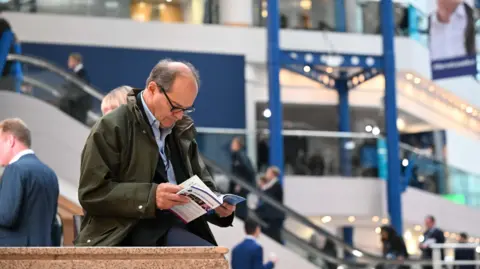Tories search for answers after election drubbing
 Getty Images
Getty ImagesThe slogan "review and rebuild" has been plastered all over this year's Conservative annual conference, the party's first out of power since 2009.
A debate has already been raging within the party about the reasons for its loss at July's election, the worst in its history.
But the looming selection of the party's next leader has spurred the quest for answers.
The party has announced that former cabinet minister Lord McLoughlin will lead an audit into what went wrong. His initial findings will be presented to Rishi Sunak's successor, after they are picked in a ballot of party members next month.
However, it will be far from the only diagnosis on offer.
Across the conference, the campaign itself came in for criticism.
Former leadership contender Mel Stride, one of the party's most regular media performers during the election, told a fringe that "blunders" including the betting scandal and Sunak's decision to leave a D-Day event early had confused the party's message to voters.
He also said the decision to call an early election in the summer had been "questionable".
Grant Shapps, one of a slew of government figures to lose their seats in July, went further, telling another fringe the decision to go early had been "tragic" and the party hadn't been ready to select and field candidates.
The former cabinet minister, known within Westminster for his data-driven approach to campaigning, launched a new group, Conservatives Together, to figure out what lessons the party needs to learn.
It argues that despite the Tories' crushing defeat, the next election is still up for grabs, with Labour's huge majority built on a "fragile" share of the vote.
It has advanced a range of reasons for the party's defeat, from a "disconnect" between the central party and local branches, to a lack of success on TikTok, seen as increasingly crucial to reach younger voters.
Smell the Coffee 2.0
Tory peer and pollster Lord Ashcroft, whose 2005 pamplet "Smell the Coffee" sought to help the party exit the electoral wilderness after its election defeat that year, has produced a 96-page paperback analysing its 2024 loss.
Drawing on polling with voters, the book, released during the conference, puts a lack of trust with the electorate at the heart of the party's poor performance.
And it was the second biggest seller at the conference bookshop in Birmingham this week.
It is a theme that all the leadership candidates have sought to embrace, with a failure to deliver on promises regularly cited in their leadership hustings.
The failure to lower levels of immigration is regularly cited. Stride admitted the party had “completely lost control” of legal migration, whilst making the pledge to stop migrant boats far too prominent.
Tees Valley mayor Ben Houchen, who became a poster boy for how the party could win voters in the "red wall" of former Labour seats in northern England, highlighted a failure to deliver on the promise to "level up" regions outside London.
“We promised exactly the right things in 2019, we just didn’t deliver any of them. That’s actually what caused the result,” he told a fringe. "We are the biggest problem to our own success."
Truss and trust
Opinion polling suggests the party's support saw two big drops in the years after its election win in 2019.
The first, around the time of the Partygate scandal, saw Labour overtake the Tories in terms of overall national popularity. This lead then widened significantly in the wake of Liz Truss's mini-budget.
"You can’t ignore the Covid parties and the mini-budget,” former Treasury minister Laura Trott conceded at one panel discussion.
Speaking alongside her, ex-cabinet minister Michael Gove said the mini-budget had dealt a "toxic” blow to the Tory brand, adding it had given voters the impression the party was "experimenting” on them.
Veteran MP Sir Geoffrey Clifton-Brown, who saw his majority slashed in his previously safe North Cotswolds seat, said the legacies of Johnson and Truss had made Sunak's job "extremely difficult".
Sunak's decision to go for an early poll, he added, likely came because he concluded "things were only going to get worse".
Away from the ups and downs of British politics since Covid, activists and politicians were also mulling longer-term trends.
How to recover the party's declining vote share among younger voters, a constant theme at Tory conferences in recent years, was also much discussed.
Penny Mordaunt, another cabinet minister ejected from Parliament in July, has been drafted in to expand its membership base, promising the "largest outreach programme" in British political history.
Making their pitches to members at the end of the conference, all four leadership contenders said they believed the party could turn things around in time for the next election, but needed to change course.
The diagnosis of defeat they subscribe to will be crucial in determining how they set out to find a cure.
